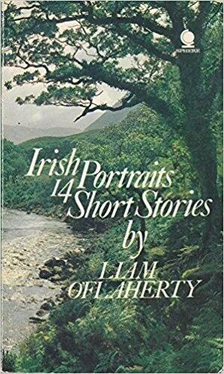There was a murmur about him now, about him and behind him. He heard it but he took no notice. His consciousness was impervious now to sound. Sound had become formless and meaningless to his ears. The music still continued. Down below people were swaying to its rhythm. But he no longer heard the rhythm. In the box, a man had planted his left foot on the fawn beast’s lap. With a languid gesture she cast it off and made a sensual movement downwards from her loins. No, not there. His eyes were also out of control. They wandered from the box along the Dress Circle, and there they suddenly became fixed once more.
There was a row of black-clothed youths like mummies sitting erect, with stiff necks and thoughtless pallid faces, gazing inanely at the stage. His ecstasy changed once more into anger. The fever left him and he became rigid. Here, here was the most foul iniquity. Not debauch nor luxury, but young humanity drained of its intelligence, an insult to the divinity of man; “the headless clowns sitting on the throne of wealth to sign the edicts of ghoulish fiends that trample the starving millions.”
Now he was completely in a state of unconsciousness. There was some excited movement about him and people were talking loudly and calling, but it meant nothing to him. Because the idea had repossessed him with terrific power. It had expanded in his brain until his whole entity had vanished and he had become purely an amorphous idea, crying: “Now, now.”
He arose slowly like an automaton, with curious stilted movements. He raised his left hand. Abruptly he pulled forth the bomb. He raised his eyes to the ceiling, he cried out:
“Man has conquered the earth. He now marches triumphantly to the conquest of the Universe. The drones stand in the way. Death to …”
His voice ended in a choking murmur as several big men pounced on him. He felt numb immediately, and then … he floated away, lying, he thought, on a soft fleecy cloud, soaring over the void of the wrecked universe.
The schoolmaster was a disagreeable man. He was always interfering in other people’s business and giving advice about things of which he knew nothing. So that, although he was an excellent teacher, he was disliked in the island of Inverara. Somehow or other everything he said or did was aggressive and insulting. He walked with his head thrown back on his fat, red neck, that bulged in little waves over the collar of his coat, and with his brown beard thrusting out in front of his face. He always wore grey tweeds and a little grey cap that was pulled so far down over his forehead that a little patch of his baldness could be seen at the rear of his skull. Then when he spoke to any one he kept one hand in his pocket, jingling his money, and stroked his beard with the other. He had a great deep voice, slow and pompous. “Haw,” he would say, somewhere down in his throat, “what did I tell you? Why didn’t you take my advice?”
At lunch time he walked up and down the road in front of his school with his lunch on his right palm on a piece of newspaper, and a clasp-knife in the other hand, eating bread and cheese. The cheese was always very high, and he had a horrid way of putting a piece between his thick red lips and then making a sucking sound. And he did that, he told the police sergeant, to persuade the islanders that bread and cheese was the healthiest and cheapest diet for a midday meal.
He was always telling the peasants that they didn’t till the land properly or look after their cattle properly, and the fishermen that their nets were not the correct depth or length. In the same manner he inveighed against the unhealthy food the people used - tea, poor American flour, potatoes, and salt fish. When John Feeney’s son Brian had the influenza the schoolmaster met John one night and said, “What are you feeding your son with?” Feeney scratched his head and said, “Faith, I’m giving him the best o’ nourishment. Pancakes.” “You’re a fool, Feeney,” said the schoolmaster in his bass voice; “give him oatmeal porridge, man.” Then young Feeney’s influenza turned into consumption, and the boy died. At the funeral the schoolmaster caught Feeney by the shoulder and bawled into his ear, “What did I tell you? Why didn’t you take my advice?”
After his wife died of the delirium tremens he began a campaign against intoxicating liquor. He would talk for hours in front of the church on Sunday after Mass, reading statistics to show how drink beggared the country and filled the lunatic asylums. “And tobacco is nearly as bad,” he would say. “Fancy a sane man making a chimney of his mouth and setting fire to his purse.”
Then one December he bought a heifer from Jim Delaney, and, since he had no land, he sent the heifer to graze on Michael Derrane’s land at so much a month. The heifer was in calf when he bought her, and she was a good-looking, healthy beast of a dark red colour with a white patch underneath her stomach. “Now we’ll see how he gets on,” said the peasants, winking at one another.
The cow spent the winter in those fields Derrane had beneath the road half a mile west of the church and all through the winter she was the main topic of conversation among the peasants in the west of the island. People were always leaning over the fence on the roadside, looking at her. Every evening after closing the school the schoolmaster went to visit her. He drove her around the field, examined her droppings and the water-tub. Then he would stoop down and look at her udder to see if she was beginning to gather milk, fully three months before she was due to calve. He became unbearable in his conversation, boasting about the cow. “Look at her,” he would say. “I am a schoolmaster. I grow my own potatoes, cabbages, onions, and parsnips in my garden. Now I’m going to have my own milk. That’s what comes of being educated and being able to use the brains that the Lord gave me.” And he spent an amount of money on agricultural periodicals dealing with the breeding and treatment of cattle.
When the cow was due to calve he had relays of the schoolchildren watching her day by day, and he hired Tom Finnigan, the labourer, to watch her at night. Every evening he gave the cow a hot drink. “Phew,” said the peasants, “be Saint Michael that cow will beggar him. it’s a true story. Put a beggar on horseback.”
The cow went twelve days over her time, and then on a Friday night just before dawn she had a speckled calf. Tom Finnigan and the schoolmaster were there, and the schoolmaster was as proud as if the calf were his firstborn child instead of a little speckled beast that sprawled about on the grass, trying to stand up. “You wait, Tom,” said the schoolmaster, “that will be the best bullock in the island in two years’ time.” Then he went home to mix another drink for the cow and left Tom to watch her.
But in their excitement they had forgotten to empty the water-tub. Tom Finnigan had been up three nights, and overcome with weariness he fell asleep sitting under the fence, and in that condition the schoolmaster found him on his return. When Torn opened his eyes there was the schoolmaster showering blows on him and yelling like a madman. “Scoundrel, scoundrel, I’ll have the law on you.” “Yer honour,” began Tom, jumping to his feet. Then he stopped and opened his mouth. The cow was standing in the middle of the field with her neck stretched low to the ground and her open mouth in the air. One side of her was flat and the other side swollen like a bladder. She had emptied the watertub.
In a short while a crowd gathered and men offered advice, but the schoolmaster paid no heed to anyone. He kept roaring, “Scoundrel, scoundrel!” and in his shirt sleeves, with froth on his beard, he rubbed and rubbed at the cow’s expanded side until the red hair was coming off in handfuls. For all that, he might as well be rubbing a mountain in the hope of flattening it out. The cow began to bellow and stagger about.
Читать дальше












